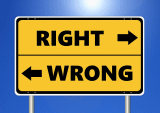
Ethics
Ethics a major branch of philosophy, is the study of value or quality. It covers the analysis and employment of concepts such as right, wrong, good, evil, justice and responsibility.
Sourced
- The most optimistic ethics have all begun by emphasizing the element of failure involved in the condition of man; without failure, no ethics; for a being who, from the very start, would be an exact co-incidence with himself, in a perfect plenitude, the notion of having-to-be would have no meaning. One does not offer an ethics to a God. It is impossible to propose any to man if one defines him as nature, as something given. The so-called psychological or empirical ethics manage to establish themselves only by introducing surreptitiously some flaw within the manthing which they have first defined.
- Simone de Beauvoir, in The Ethics of Ambiguity (1947)
- Poetry is an ethic. By ethic I mean a secret code of behavior, a discipline constructed and conducted according to the capabilities of a man who rejects the falsifications of the categorical imperative.
- Jean Cocteau, in Diary of an Unknown (1988)
- Strong ethics keep corporations healthy. Poor ethics make companies sick. Values are the immune system of every organisation.
- Patrick Dixon, in Building a Better Business (2005), p. 131
- There is good and there is Evil.Evil must be Punished.Even in the Face of Armageddon,I will not Compromise This
- Rorschach Watchmen
- I believe, indeed, that overemphasis on the purely intellectual attitude, often directed solely to the practical and factual, in our education, has led directly to the impairment of ethical values. I am not thinking so much of the dangers with which technical progress has directly confronted mankind, as of the stifling of mutual human considerations by a "matter-of-fact" habit of thought which has come to lie like a killing frost upon human relations. ... The frightful dilemma of the political world situation has much to do with this sin of omission on the part of our civilization. Without "ethical culture," there is no salvation for humanity.
- Albert Einstein, in "The Need for Ethical Culture" celebrating the seventy-fifth anniversary of the Ethical Culture Society (5 January 1951)
- One has a feeling that one has a kind of home in this timeless community of human beings that strive for truth. … I have always believed that Jesus meant by the Kingdom of God the small group scattered all through time of intellectually and ethically valuable people.
- Albert Einstein, quoted in Einstein's God — Albert Einstein's Quest as a Scientist and as a Jew to Replace a Forsaken God (1997) by Robert N. Goldman
- Ethics, too, are nothing but reverence for life. That is what gives me the fundamental principle of morality, namely, that good consists in maintaining, promoting, and enhancing life, and that destroying, injuring, and limiting life are evil.
- Albert Schweitzer, in Kulturphilosophie (1923), Vol. 2 : Civilization and Ethics
- The great fault of all ethics hitherto has been that they believed themselves to have to deal only with the relations of man to man. In reality, however, the question is what is his attitude to the world and all life that comes within his reach. A man is ethical only when life, as such, is sacred to him, and that of plants and animals as that of his fellow men, and when he devotes himself helpfully to all life that is in need of help. Only the universal ethic of the feeling of responsibility in an ever-widening sphere for all that lives — only that ethic can be founded in thought.
- Albert Schweitzer, in Out of My Life and Thought, An Autobiography (1933) translated by C. T. Campion, Ch. 13, p. 188
- Let me give you a definition of ethics: It is good to maintain and further life — it is bad to damage and destroy life. And this ethic, profound and universal, has the significance of a religion. It is religion.
- Albert Schweitzer, quoted in Albert Schweitzer : The Man and His Mind (1947) by George Seaver, p. 366
- Ethics does not treat of the world. Ethics must be a condition of the world, like logic.
Ethics and Aesthetics are one.- Ludwig Wittgenstein in his Journal (24 July 1916)
